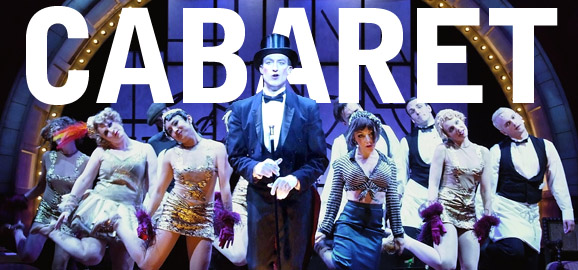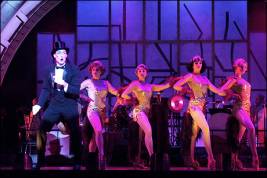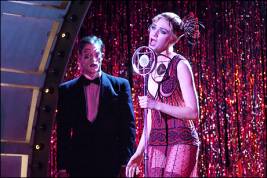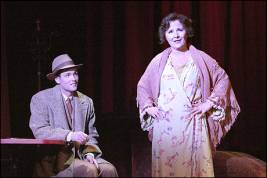
It takes chutzpah to fiddle with a classic and heaps of talent to pull it off, both of which Tony-nominated director-choreographer Marcia Milgrom Dodge does to breathtaking effect in her brilliant revisal of Joe Masterhoff, John Kander, and Fred Ebb’s Cabaret for Reprise Theatre Company.
This is, of course, not the first time there’s been a “new” Cabaret. The 1972 film adaptation of the 1966 Broadway smash took out all the “story songs” to focus on Liza Minnelli’s Kit Kat Klub performances as an Americanized Sally Bowles and gave hero Cliff Bradshaw some offscreen same-sex canoodling of the sort Christopher Isherwood, Cliff’s real-life counterpart, engaged in in early 1930s Berlin. A 1987 return to Broadway gave Cliff a new song, one that later got axed in the far more successful 1998 revival, a darker, grungier, more overtly sexual vision of pre-WWII Germany than we’d seen before, and one which added songs from the film and deleted numbers from the ’66 original.
It’s this late-‘90s Sam Mendes version that most theaters have replicated in the years since, with plenty of bruised bodies in ripped black gear and numerous audience members seated at Kit Kat Klub tables as part of the set design.
Cabaret 2011 director-choreographer Dodge fuses bits of the original, the movie, and the show’s various revivals with her own inspired concepts to create a Cabaret that may well have you feeling you’re seeing the show for the first time, particularly as performed by a unanimously stellar cast.
Scenic designer John Iacovelli sets an opulent tone from the get-go, backing the stage with rich red velvet curtains, George Grosz paintings hanging on either side of the set, all of which lighting designer extraordinaire Jared A. Sayeg saturates with rich reds and blues and purples whenever we’re inside the Kit Kat, Sayeg’s lighting becoming stark in “real life” scenes. (This is, incidentally, Iacovelli’s and Sayeg’s first work since receiving Scenies as Scenic and Lighting Designers Of The Year.) Kate Bergh’s opulent costumes are not what we’ve been expecting either. Our emcee enters, not bare-torsoed with rouged nipples but wearing an elegant tuxedo, there’s not a tear or bruise on the Kit Kat Girls, and the Boys look more like Hello Dolly waiters than the sleazy sex toys of the Mendes revival.
If at first this seems a bit disconcerting and even out of place for the story we know from experience is ahead, there is method in Dodge’s madness. All this glitz, and a bright and bouncy “Telephone Song” (virtually unheard in recent years) which has Kit Katters singing and dancing and flirting by phone, is there to trick us into thinking we’re in for a Jerry Hermanesque evening of fun and frolic, as the show’s title might suggest to the uninitiated.
A number of songs have been cut, most notably “Mein Heir,” first heard in the movie adaptation. Though certain Cabaret buffs may well protest its excision, “Meeskite” is likely not to be missed, and Cliff’s “Why Should I Wake Up” has been replaced by “Don’t Go,” heard only in the ’87 revival and sung here in an inspired pairing with Sally’s “Maybe This Time,” the songs reflecting the couple’s contrasting views on love and romance.
Still, what theatergoers will remember most about Cabaret 2011 are its all-around magnificent performances, and the way each integrates itself into Dodge’s brilliant vision.
With his tall, lanky stature and aquiline nose, Bryce Ryness (USC’s gift to Broadway) gives the Emcee a spectral, at times even cadaverous look, as the triple-threat chameleon celebrates his unorthodox living arrangement with “Two Ladies” clad only in lederhosen, his roommates in a pair of Heidi frocks; performs “If You Could See Her” in Chaplinesque slapstick mode, looking frighteningly like The Great Dictator; and sings a languorous “I Don’t Care Much” à la Dietrich, a 16th Century ruff around his neck and a foot-long cigarette holder at his lips. Ryness’s Emcee is a dazzlingly conceived and executed performance by a gifted local talent gone national.
Cabaret features four recent Scenie-winning performers once again doing scene-stealing work, beginning with Gigi’s Lisa O’Hare, who may well have been the best Eliza Doolittle ever and now redefines Sally Bowles with a mixture of girl-next-door prettiness, supermodel glamour, screen siren sex appeal, Broadway-ready pipes, and as charismatic a stage presence as you’re likely ever to see in a Sally. O’Hare is saucy and sassy in “Don’t Tell Mama,” delightfully Noël Cowardesque in “Perfectly Marvelous,” and vulnerable yet determined in “Maybe This Time.” As for the title song, Dodge and O’Hare turn it on its head by having Sally’s breakdown occur early on, with the rest of the number (starting from “I used to have a girlfriend known as Elsie…”) sung as a soliloquy, Elsie’s example inspiring Sally to end the song on a high note of joy rather than its customary despair.
Mary Gordon Murray follows her Scenie-winning turn as the elegant North Carolinian Margaret Johnson in The Light In The Piazza with what may well be the very best Fräulein Schneider you’ve seen, from the giddy schoolgirl-in-love looks Murray gives Robert Picardo (excellent as Herr Schultz) to her stunningly gutsy renditions of “So What” and “What Would You Do,” both of which bring down the house. Murray and Picardo’s duets—“It Couldn’t Please Me More (Pineapple Song)” and “Married”—simply couldn’t be more charming.
2010-11 Scenie winners Jenna Coker-Jones and Katherine Malak head an all-around sensational ensemble, which also features Bradley Benjamin, Rachel Crissman, Aurore Joly, Janelle Junio, Brett Leigh, Jonathan Mercer, Mark C. Reis, Josh Walden, Justin Michael Wilcox, and Christopher Zenner, the dozen triple-threats executing Dodge’s complex dance moves to precision perfection after a mere ten days of rehearsal.
Jeff McLean does fine romantic, dramatic and vocal work as Cliff, a terrific Zach Bandler (Ernst) is so dashingly German that you can hardly believe he’s Oregon born, and Katrina Lenk is, not surprisingly, the best Fräulein Kost ever, Dodge giving the “Tomorrow Belongs To Me” reprise to the award-winning star of Lovelace: A Rock Opera, Lenk singing it to the rafters as Herr Schultz, prophetically, sleeps through it.
A few other Cabaret 2011 moments stand out: a spine-chilling rendition of “Tomorrow Belongs To Me” by Ryness and the Kit Kat waiters, an Act Two “Kick Line” with the entire dance ensemble high kicking in black stockings and lace-frilled black undies, and a “Finale Ultimo” which reveals the fates of the Kit Kat Klubbers under Hitler’s Third Reich to devastating effect.
Music director Christy Crowl conducts a perfectly marvelous all-female onstage orchestra. (Crowl also provided additional orchestrations.) Philip G. Allen’s sound design not only mixes voice and instruments to perfection but ups the suspense with various effects. Benjamin is assistant choreographer and dance captain, Lloyd Cooper associate music director, Joe Soldo music coordinator, Brad Enlow technical director, and Jill Gold production stage manager.
Some may have wondered when Reprise announced its 2011-2012 season (which also features the considerably more rarely performed The Baker’s Wife and The Apple Tree) whether there was anything new that could be done with a 45-year-old classic. The answer is a resounding “Yes!” Whether you’ve seem umpteen past Cabarets or this is your maiden trip to the Kit Kat Club, Cabaret at Reprise is not to be missed.
Freud Playhouse, 245 Charles E. Young Drive East, UCLA Campus, Los Angeles.
www.reprise.org
–Steven Stanley
September 14, 2011
Photos: Ed Krieger






 Since 2007, Steven Stanley's StageSceneLA.com has spotlighted the best in Southern California theater via reviews, interviews, and its annual StageSceneLA Scenies.
Since 2007, Steven Stanley's StageSceneLA.com has spotlighted the best in Southern California theater via reviews, interviews, and its annual StageSceneLA Scenies.







 COPYRIGHT 2025 STEVEN STANLEY :: DESIGN BY
COPYRIGHT 2025 STEVEN STANLEY :: DESIGN BY